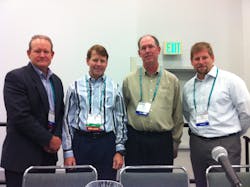With 40 percent of Emerson Process Management’s business coming from the oil & gas sector, this industry often leads the way in new technology implementation and in delivering best practices for other industries to follow.
Some of the biggest project challenges facing the oil & gas industry today include a retiring workforce, rapid depletion rates of existing oil and gas resources, increasingly complex projects, fewer available specialists, and ever-larger capital expenditure projects.
“We’ve long since found the easy oil and gas,” said Larry Irving, vice president of oil & gas for Emerson Process Management. “Finding new sources requires longer, more complex projects.”
To address these challenges, the clear trend across the oil & gas industry is toward the use of MACs (main automation contractors). The key to successful engagement with MACs is to engage with them early in project development to create optimum automation designs and reduce costs. Doing this, however, does not entirely mitigate the tendency for project I/O count to grow substantially during deployment, which can cause delays in construction drawings and delivery of automation systems
A major technology advance that is helping address the issues of growing I/O count and project changes is Emerson Process Management’s CHARMs (a CHARM is a single-channel component with an A/D converter and signal characterizer inserted onto the terminal block where field wires are landed. Each device can be landed anywhere on the strip regardless of its signal type.)
In a benchmark test done with a global provider of engineering, procurement and construction (EPC) services, CHARMs saved $375,000 in re-engineering and scheduling delay costs, as well as $100,000 in cabinet modification costs.
Another project done on an oil & gas project in the Gulf of Mexico called for use of 20,000 instruments and 60,000 connections. Use of CHARMs reduced connection requirements by 65 percent (about 42,000 connections). CHARMs’ electronic marshalling approach uses pre-designed, pre-tested, non-custom equipment instead of custom cabinets typical of large projects like this.
Leaders relevant to this article:


